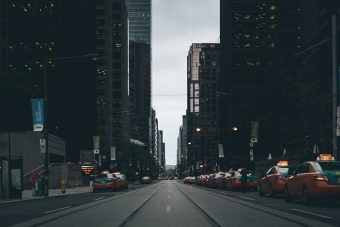Uber will charge its customers in London an extra 15p per mile on every trip to help its drivers buy electric cars.
The ride-hailing app hopes to create a £200m fund from the levy to encourage almost half of its 45,000 drivers to use fully electric vehicles by 2021. The firm hopes its London fleet will be fully electric by 2025.
Uber said the clean air fee would mean an extra 45p on the average three-mile trip in the capital, on top of normal fares, but every penny would go towards helping drivers upgrade their vehicles or other green initiatives should that money not be used.
The fund was announced as part of a clean air plan, as Uber continues its efforts to prove itself to Transport for London after it initially decided not to renew its licence to operate last year.
Uber’s chief executive, Dara Khosrowshahi, said the initiative, a world first for the company, showed it was committed to being a strong partner in the capital. “It represents our wanting our partnership in London not only to be a strong partnership but trailblazing in solving air pollution, which every great city in the world is struggling with, and our mayor here in London is looking to improve,” he said.
However, Khosrowshahi said Uber would continue to resist proposals to make its drivers liable for London’s congestion charge, unless black cabs were also forced to pay.
Under Uber’s new scheme, each driver will in effect have their own savings account towards the purchase of an electrical vehicle, based on the number of miles driven. A driver using Uber’s app for an average of 40 hours per week could expect to save about £3,000 towards a new electric vehicle in two years.
Uber said it was in talks with manufacturers to negotiate prices and ensure supply, as well as to home vehicle charging suppliers.
Khosrowshahi said: “You’re going to see many initiatives but what it adds up to is us moving from being a simple ride-sharing service to transforming to an on-demand mobility service. We ultimately want to be that go-to mobility platform – whether you’re going to move with the car or a bike or ultimately a bus or the tube service. All this is aimed at eventually replacing car ownership itself.
“Cars are unused 95% of the time and take up enormous amounts of space, in parking etc – we want to give that space back to the city.”

Uber is also offering a diesel scrappage bonus of £1,500 in credit for its app to the first 1,000 people in London to scrap a pre-Euro 4 diesel vehicle.
Khosrowshahi said: “It’s our goal to help people replace their car with their phone by offering a range of mobility options – whether cars, bikes, scooters or public transport – all in the Uber app.”
The chief executive said he was confident most drivers would take up the chance to spend their clean air fee savings on a new electric vehicle, but the fund would otherwise be used for other green schemes. “We won’t bank it.”
The IWGB union, which represents private hire drivers, said: “We are very concerned that this latest PR move from Uber will lure drivers deeper into debt, as they struggle to finance expensive vehicles on below minimum wage income. The answer to London’s growing congestion and pollution problem is for the government and the mayor to resolutely commit to capping minicab numbers in London.
“Drivers have long ago given up on Uber to do the right thing and that is why so many will be joining our march next week with other precarious workers, as we get ready to face down yet another appeal from Uber on the worker rights case we already won on two occasions.”
The UK government has just slashed its grants for electric vehicles from £4,500 to £3,500 and abolished support for new hybrids, which many Uber drivers use.
Source: The Guardian

